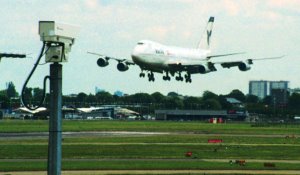More surveillance, more restrictions.

Britain already has the unenviable accolade of having the most CCTV cameras in operation in the entire world, and with ID cards still set to be introduced, you'd think that the government would be satisfied for a while with the huge amounts of data is collecting on its own people. Obviously not though, as it sets about keeping even more information and obtaining more under the auspices of counter-terrorism and organised crime:
The police and security services are to be given access to advanced travel details on more than 40 million passengers a year who travel on domestic flights and ferries within Britain under legislation to be announced tomorrow.
The new power in the police and justice bill will give the authorities the ability to screen and track the movements of suspected terrorists and serious criminals within Britain for the first time.
It is expected that airlines will have to provide the personal online details of all passengers as they book seats and subsequently check in at the airport. There are discussions with the travel industry over what documents passengers will have to show before they can board a flight in Britain.
The new system will enable them to check names against watchlists for terror suspects and wanted criminals and to develop a "profiling system" of those worthy of further scrutiny. It is hoped that the system will help the security services develop a picture of terror and crime suspects' travel patterns and networks.
On specified routes where there is considered to be a major threat, the police will be able to demand the provision of "bulk data" - blanket passenger and crew lists - on all flights travelling on that route before departure. The Liberal Democrats said last night that they were extremely concerned about the routine surveillance of domestic passengers and claimed that Britain was now building a surveillance infrastructure unparalleled in the free world.
The home secretary, Charles Clarke, is to announce that he intends to extend these powers to all domestic passengers travelling on flights and ferries. Airlines such as Ryanair and Easyjet already insist on photo-ID before a passenger boards a domestic flight. Some airlines have expressed concerns that the demand for online information will extend existing check-in times.
One operator has estimated that the process will add 40 seconds to the 60-second average check-in time, but that included manually typing in the home address and place of birth of each passenger. It is anticipated that identity documents will contain, sooner rather than later, such information on a machine readable strip.
The police say that a combination of operational experience, specific intelligence and historical analysis will be used to build up pictures of suspect passengers and patterns of travel behaviour. They claim this will enable them to develop a more targeted approach which will reduce the likelihood of innocent travellers being stopped and incorrect intelligence reports being filed. But such "profiling" of passengers has proved highly controversial in the United States.
I find it rather amusing that the airlines only seeming objection to these plans seem to be that they'll add 40 seconds to check in time. Privacy isn't one of their main concerns it seems, although it has to be said that they wouldn't be keen on one of their planes being used to crash into some tall building, however unlikely that is. The whole thing seems to be based on the US system, where numerous passengers have been ordered off planes, planes have been diverted to other airports to remove passengers who are unfortunate enough to have a name matching one on a terrorist watch-list, where children have been refused access to air travel because of their name, and where Cat Stevens (Yusuf Islam) was briefly arrested for suspected terrorist sympathies/funding terrorist groups. In short, there will no doubt be a number of monumental fuck-ups, to quote an unconnected police source.
The most worrying thing though is the amount of information and data that the government now is able to hold on the individual. This law will increase the government's capability to follow anyone nearly wherever they go - and there is already such a system in place in Bradford, which can track car number plates throughout the city. All of this has gone on with hardly any public consultation. Maybe it's because CCTV has been credited with making people feel safer, and the opposition to it has tapered off remarkably in recent years. Maybe it's because people are now prepared to sacrifice their privacy for their "safety". Or maybe it's because the government, local councils and businesses have not listened to the public when they have stated they have wanted privacy. As it is, it seems to hard disagree with the Lib Dems when they say the government is building a surveillance infrastructure - watching what the citizens are doing while ignoring what the CIA is doing in the skies.
Post a Comment